- Home
- Hugh Howey
Sand: Omnibus Edition Page 7
Sand: Omnibus Edition Read online
Page 7
He cut through a row of apartments that abutted the back of the dive school. Palmer was probably back at his place right now helping Rob unpack and air out the tent. But still a good idea to check the dorms and see if he’d crashed there the night before.
Ms. Shyler waved from her porch as he passed. She went back to sweeping the sand out of her house, when one of her kids stomped inside, transferring some of it back. She turned and yelled at the boy, was her own sissyfoot in a way. They all were. The men building the house from the remnants of a house, all these tasks that required doing over and over with no end in sight, filling canteens and eating, shitting, sleeping, looking forward to a weekend and dreading the week that would come after. Life was lived by sissyfoots, all of them. One bucket of sand at a time.
He had to stop thinking like that. There was progress somewhere. Something better. That’s what the slow stagger of men, women, and families believed as they marched off toward the horizon. They believed in a life far away from the fighting and the bombs. Away from the riots and the patter of morning gunfire. Away from the shops where sunlight and sand filtered through bullet holes in wrinkled tin. Away from Lords with fickle rules and those who meant to topple them with indiscriminate bombs.
There had to be a reason so many left and never returned. It was the allure of a good life. Or simply no longer being able to stand the sound of distant grumbles, drums, and thunder without feeling an urge, a compulsion, to go see for themselves. That’s what his father must’ve believed. It had to be what he felt. Conner’s mom was just trying to poison the memory of the man because she hated her own life. That was it.
The door to the dorms was open, letting the light and a swirl of drift in. Conner stepped inside. There were two dive students in the back of the bunkroom, a clatter of dice. They turned when Conner’s shadow darkened the pips. “Have you guys seen Palmer?” he asked.
One of the boys shook his head. “He and Hap are out on a dive. They’re not back yet.”
“Wasn’t that a week ago?” Conner asked.
“So it was a long fucking dive. How should I know? They were all secretive about it.”
“Yeah,” Conner said, dejected. “Thanks.” Another year of disappointment from their big brother. Poor Rob.
“Yo, please kindly shut the fuck up,” someone called from one of the bunks.
Conner apologized and left. The dice clattered against the wall.
Heading home, he realized it would just be him and Rob that night, which screwed up his plans a little. Still workable, though. It would fall on him to lead the talk and to work the lantern. He wasn’t prepared. Especially not after visiting his mom. All of his stories had been told and retold to death.
He hiked back through the schoolyard and tried to match his memory of his father with his mother’s account. He’d had much more of her version of events than actual time with his dad. He’d been six when his father had left, had spent twice that number of years living in his absence, relying on stories passed down from others. Vic had done her share to muddy his recollection, telling all the stories from when their dad was younger, growing up in Low-Pub, making a name for himself as a diver, the years leading up to his taking over as Lord of Springston, back before his breakdown.
Conner wondered if dredging up the past was even a good idea. It was like being a sand diver in a lot of ways. There were all these rusty hurts buried deep. Bringing them up and trying to oil them, sand them, make them into something they could never be again—how was that healthy? Maybe it wasn’t worth it to know who his dad was. Maybe his mom was right and he should just move on. If their dad did come back, he would be older, weaker, grayer, not the same man. Clinging to an idealized past was a poison of sorts, that bastard Nostalgia, making people think there was a better time and place if they could just get back to it.
He glanced toward the great wall, that towering symbol of his past with its dangerous lean. A distant grumble from No Man’s Land could be heard, the faint boom boom boom of who-the-fuck-knew-what. The future, that’s what. The very near future. The grumble of the unknown, like a hungry stomach that knew it needed feeding, like the hungry soul that needs some new adventure, the boom boom boom of a man’s pulse when he’s scared he won’t amount to shit, that if he sits still, the dunes will claim him.
The three canteens rattled emptily by Conner’s hip, and he remembered he needed to stop and fill them. He needed to buy some jerky as well. Between Gloralai and his mother and Palm being an asshole, his brain was well and truly scrambled. His father’s boots didn’t help matters at all. He passed through the low Bleak Wall, which divided Springston and Shantytown in disjointed gaps and divides, a cheap and hasty imitation of the larger wall farther east. In the morning shade of the wall, a game of football was being played, shirts and skins. Boys Conner’s age ran back and forth, kicking an inflated gooseskin and tackling one another, coming up covered in sweat and sand. There were three skins and four shirts. Guilla, a friend of Conner’s, tackled a boy from Springston. As they disentangled themselves, Guilla spotted Conner skirting the playing field, which was laid out by canteens and shoes.
“Yo, Con!” he shouted. “We need another.”
“Can’t,” Conner said. “Wish I could.”
Guilla shrugged, and the boys returned to their storm of sand-clouds and scrapes.
Past the wall, there was a line at the cistern. Conner fished in his pockets for three coins and waited his turn. He watched a mother scold her son in the middle of a path, saw Jenkins’s dad emerge from their small walled garden holding a headless snake in one hand and a hoe in the other, then march inside their house probably to cook it. He became hyperalert at any gathering like this, saw all the tiny details of normal life humming right along. This was when the bombs came and ripped through crowds. At funerals and weddings and religious celebrations. At cisterns and cafes and protests. It was strange how tense one could become while surrounded by the banal. It was the waiting, waiting. It made Conner want to flee his flesh, sitting still in that creeping line. It was why he had to go.
Finally, it was his turn. He paid his coins and watched the canteens fill. “To the brim,” he said. The pumpman looked at him with disdain but didn’t skimp. Conner put the three straps over his head, the canteens heavy and full on his hip. He headed off to buy some jerky. It would wipe him out, this trip. He reached into his pocket and felt the last of his coins there. Crossing the empty patch of dunes between the cistern and the market, mentally packing for his journey, the ground suddenly shifted beneath his feet—
Conner stumbled. He nearly fell forward, had to throw his arms out for balance, his mind seizing on the idea that it was the damn boots, the band shorting out in his pocket from canteen water, fucking Rob. But he heard the hiss of flowing sand, and then the laughter of boys, and Conner couldn’t move. He looked down to see his legs buried up to his knees, the sand packed so hard around his shins that his feet throbbed. He couldn’t fall over if he tried.
“Whadja step in, Whoreson?”
Twisting at the waist and craning his neck, Conner could see Ryder and two others behind him. They had sand in their hair and on their shoulders, visors pressed up on their foreheads, had probably been diving in the training dunes near school or had seen him checking the dorms. Conner tried to pull his boots free but couldn’t.
“Let me go, Ryder.” He stopped struggling and fought the urge to say This isn’t funny, because that would only draw laughter. He fought the urge to remind the boys that sandtrapping someone like this was a buryable offense, because that would only bring more threats. Reaching into his pocket, he felt the band there that his brother had made. If only the power weren’t in the boots—
“Hey, Whoreson, I’ve got a question.” Ryder stepped around in front of him, grinning. The other two boys flanked Conner to either side. “When you were a baby, how much did your mommy charge you to suck her tits? ’Cause she charges my dad five coin each!”
The laughter echoed
over the dunes. The sun was barely up, but to Conner it suddenly felt like midday. Ryder stepped close. Conner could smell stale beer and onions on the boy’s breath.
“I don’t want to see you near her,” he said.
Conner knew who Ryder meant. He tried to hold his tongue, but couldn’t. He should’ve told Ryder the truth right then and said he would never see her again anyway. That none of this bullshit mattered. That they were kids and the fucking sand didn’t care. Instead, he sneered at Ryder, unable to resist. “That’s for her to decide.”
Ryder smiled. “That’s where you’re wrong, boy. Ask your mom who decides.” He gripped the back of Conner’s neck and squeezed. Conner wanted to punch the bigger boy, but he knew how badly that would go. There were three of them, and his boots were pinched. “There are men in these dunes and then there are little boys like you. I’m a sand diver, and we take what we find. And I found her first.”
“You’re a trainee,” Conner said. “You’re not even a sand—”
There was a flash of rage on Ryder’s face—a horrible spasm of bared teeth and wrinkled brow—just before the sands opened and Conner was sucked down.
Conner’s mouth filled with grit. The earth had opened for him, dropping him down beneath sand as loose as water. His feet hit something solid below. Swimming with his arms, his head bumped into a wall of sand above. There were walls on all sides. Ryder had made a solid box filled with flowing sand, a death coffin.
Conner sealed his lips, half a dune in his mouth, the loud crunch of grit between his teeth, and fought the urge to swallow or spit. Only had the barest of lungfuls. Had been talking. But his sister had done this to him before, had taught him to be calm, to last a minute or more. If he counted to ten, Ryder would bring him up. He was just trying to scare him. Conner thought this, but part of his brain screamed: We’re gonna fucking drown. Do something, asshole.
With sand burning his eyes, Conner fumbled blindly at his father’s boots. His head flipped upside down. He had to remember which way was up. Had to remember. Goddamn, he couldn’t breathe. Couldn’t swallow. He hit the power switch under the tongue of the left boot with one hand and pulled the band out of his pocket with the other. C’mon, Rob, he thought. C’mon, brother.
Conner pressed the band to his forehead, couldn’t feel anything, too much sand between the contacts. Damn thing was upside down, that’s why. The wires were coming out the top. He tried it again. Could feel the sand now. No idea if this would be strong enough. Needed to be stronger than Ryder. Was about to black out. Had to go. Had to go. With desperation, he didn’t flow the sand so much as explode it. Arms over his head, expecting a collision, hoping this was up, that this was up, not sure—he felt the sandwall above him shatter, felt his arm break the surface, his head and then his entire body rising out of the sand.
The other boys lost their footing in the flow. Conner was on his hands and knees, spitting the grit out of his mouth—grit that had turned to mud. He coughed and wheezed, and the black edges of his vision receded. Arms and legs weak, he fumbled for the band, tried to get it back on his head before they came at him again. Damn—the boots—strong as a whole suit. Shouldn’t have been possible. Fucking Rob—
A hand clenched over his knuckles and squeezed into a fist, the bones of his fingers grinding together. Conner dropped the band and grimaced in agony. Ryder was down on one knee, casting a long shadow over him, his face a mask of rage.
“You think you’re a diver, boy?” Conner watched as Ryder grabbed the band with his free hand and yanked it free, ripping the wires. “Patrol would bury you for this.” He shook the band in front of Conner’s face, and the grip with his other hand tightened, crushing his knuckles. “You’re lucky I don’t tell them. That’s your life I just saved.” Ryder spit into the sand and dropped the band. “I fucking own you. Don’t you forget that, Whoreson. I own you like every man in Springston owns your goddamn mother.”
A swift kick in the ribs for punctuation. And then the boys were back to laughing. The sand trembled and opened up, and they dove and disappeared.
Conner rested his forehead on the warming sand and took deep breaths. When he spit, it colored the sand like a sunrise. This is my life, he thought miserably. But not for long.
15 • Sins of a Father
Conner got up and dusted himself off, probed his tender ribs. A sip of water swished and spat got most of the grit out of his mouth. His anger soon abated. It was from looking down—not at the pink sand between his father’s boots—but at the old band torn loose and curled amid a tangle of wires.
He stooped to retrieve the band and inspected it again. Ryder would’ve let him up. Was just messing with him. Damn, he should’ve just waited it out. But the boots—he remembered how solid the sand had felt the night before, clenched around Rob’s legs. Scanning the training dunes, he looked toward the school. He still needed to get jerky, but another quick errand first. His trip that evening just got more interesting. He needed to show a friend these boots.
Around the corner from the school stood a line of shops that catered to scavengers. Used suits, visors, repair stalls, fins, electronics, all the scraps and tools of the trade. This was an industry honed by abrasive necessity. Practically all of Springston, Shantytown, Low-Pub, Pike, and the gardens to the west were built with dredged spoils from beneath the sands. The mounds of dirt that rose up and were in shallow enough sand to reclaim had been discovered by divers. The same divers who went on to do the digging. Water, gas, and oil pumps relied on divers. It was the industry on which all others were founded, which is why the death toll hardly dented the number of enthusiastic volunteers and why most of the kids who dreamed of entering dive school found packs of others standing before them. It was why many never got the chance.
Conner hurried through the bustling Saturday markets in the dive district and down one of the side alleys that kept creeping along with the dunes. He let himself into Graham’s, one of the larger shops. An annoying collection of bells and chimes clattered and rang as the top of the door struck them. Inside, the walls were covered in artifacts. Mirrors and clocks, pumps and small motors, coils of wire and tubing and pipe, and bin after bin of bolts, washers, and nuts. Across the high ceiling hung the remains of dozens of bicycles. Conner had to duck under a few of these.
Most of the goods that studded the walls and hung from the rafters had been brought up by Graham himself. The rest had been bartered for with something else he’d discovered. Despite appearances and the occasional price tag, hardly any of it was for sale. Convincing Graham to part with a single washer could take weeks of pleading. Trade was the only coin that worked, and Graham always got the better end of the deal. He was a pain in the ass, but had been good friends with their father, which meant getting work done even without an official dive card from the Guild.
“Graham?” Conner let himself through the counter and peered into the workshop. Graham glanced up from his bench. He had a wire brush in one hand and what looked like part of a rifle in the other.
“Con.” He smiled. “Thought you were off camping this weekend.”
“Tonight. I’m getting some water and a few other things while Rob airs out the tent. Hey, I want you to take a look at something for me.”
Graham pushed his glasses up his nose. “Sure,” he said. “You scavenge up something good?”
“You know I’m not allowed to dive.”
“Sand in your hair says you do.”
Conner touched his hair, and sand rained down. He stared guiltily at the mess. “Sorry—”
“Forget it.” Graham shooed his apology like a fly. “Never gets all the way clean in here. So what’ve you got?”
“It’s this band here that Rob made.” Conner reached into his pocket and pulled out the band. He handed it to Graham. “The wires are ripped loose—”
Graham gave the band a cursory glance. He leaned over his workbench and studied the wires trailing over Conner’s belt, then looked down at his feet.
; “Dad’s boots,” Conner explained.
“I see that. You got a suit on under there?”
“No, that’s the thing. You know how Rob is, well, I caught him trying to dive with these last night. Wasn’t doing too bad a job of it—”
“Diving runs in your family,” Graham said. “Guild made a mistake not taking you in.”
“Yeah, well, it’s just these boots, see? No suit. But I felt what they could do to the sand and I wondered if you’d seen anything like this before.”
“You felt it,” Graham said. “So how far down did you go?”
Conner glanced over his shoulder, made sure they were alone. “A meter. Maybe two.”
Graham sniffed. He flipped the band inside out and adjusted the long-armed and multi-jointed light affixed to his desk. “People have toyed with these before. You can have some fun with a pair of boots. Skate along the sand, dip your toes and what-not. But they’re no good for diving. If you can’t keep the pressure off your chest, you can’t breathe. And even if you could, you’d be in a world of hurt when you came back up. Did Rob do the wiring?”
“Yeah.”
Graham looked up from his study of the band. “He’s better than you.”
“Yeah, I know.” Graham didn’t mean it with malice. He didn’t have a cruel bone in his body. But the power of dry observation sometimes felt the same. He made space on his workbench, setting that long steel barrel aside. He plugged in his soldering iron.
“Can I see the boots?”
“Sure.” Conner pulled the wires out at his knees and kicked off his dad’s boots. “He put the power charge in the left sole.”
“Interesting,” Graham said. He grabbed a magnifying glass from his desk and peered into one of the boots, removed the leather insole. He inspected the other one. “Looks like he made room inside the right one to stow the wires and the band. A visor too.” He glanced up at Conner. “A meter, you say?”

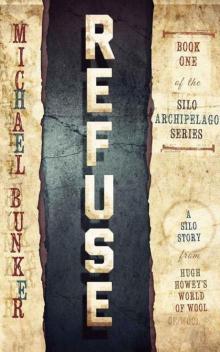 Refuse (The Silo Archipelago Series Book 1)
Refuse (The Silo Archipelago Series Book 1)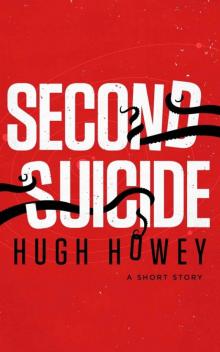 Second Suicide: A Short Story
Second Suicide: A Short Story Machine Learning: New and Collected Stories
Machine Learning: New and Collected Stories The Walk Up Nameless Ridge
The Walk Up Nameless Ridge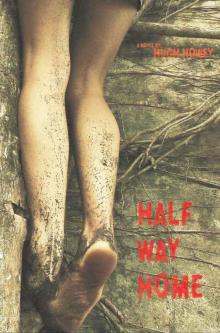 Half Way Home
Half Way Home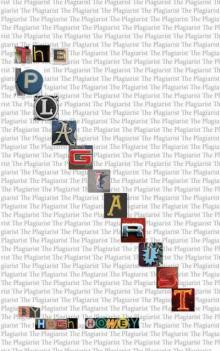 The Plagiarist
The Plagiarist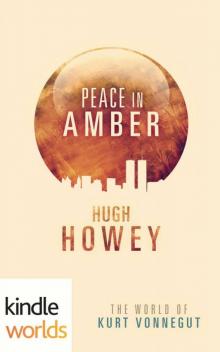 Peace in Amber
Peace in Amber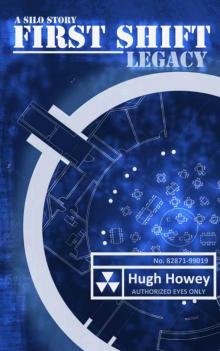 First Shift: Legacy
First Shift: Legacy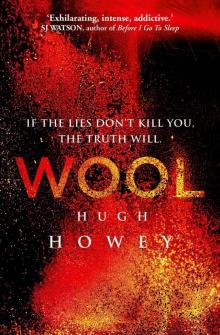 Wool
Wool Glitch
Glitch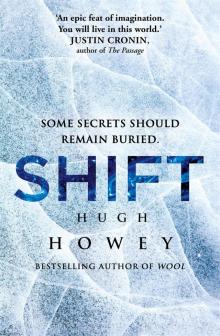 Shift
Shift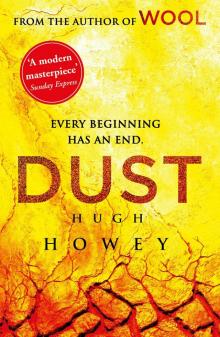 Dust
Dust Molly Fyde and the Land of Light
Molly Fyde and the Land of Light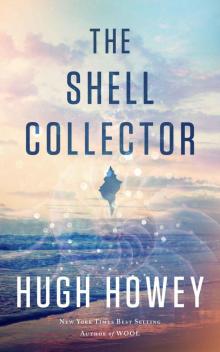 The Shell Collector
The Shell Collector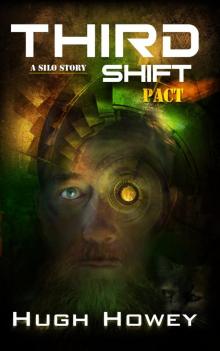 Third Shift: Pact
Third Shift: Pact Molly Fyde and the Fight for Peace
Molly Fyde and the Fight for Peace Sand Omnibus
Sand Omnibus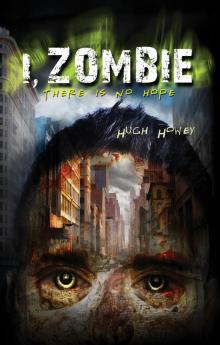 I, Zombie
I, Zombie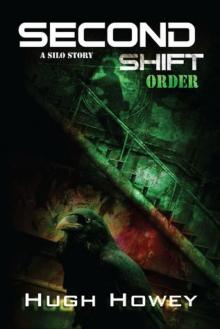 Second Shift: Order
Second Shift: Order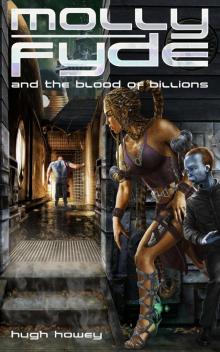 Molly Fyde and the Blood of Billions
Molly Fyde and the Blood of Billions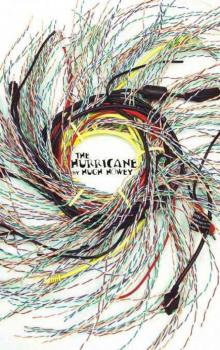 The Hurricane
The Hurricane The Box
The Box Glitch_A Short Story
Glitch_A Short Story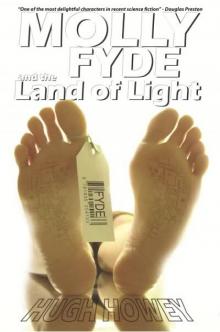 Molly Fyde and the Land of Light tbs-2
Molly Fyde and the Land of Light tbs-2 Machine Learning
Machine Learning Resist
Resist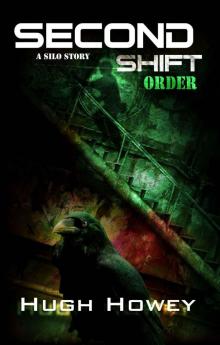 Second Shift - Order (Part 7 of the Silo Series) (Wool)
Second Shift - Order (Part 7 of the Silo Series) (Wool)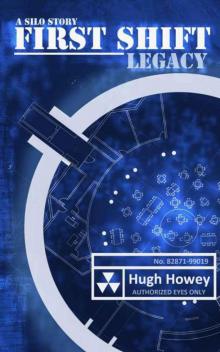 First Shift - Legacy s-1
First Shift - Legacy s-1 Stories on the Go: 101 Very Short Stories by 101 Authors
Stories on the Go: 101 Very Short Stories by 101 Authors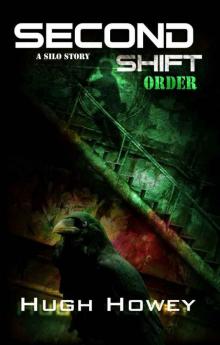 Second Shift - Order s-2
Second Shift - Order s-2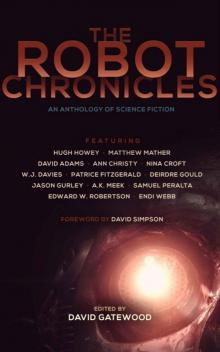 The Robot Chronicles
The Robot Chronicles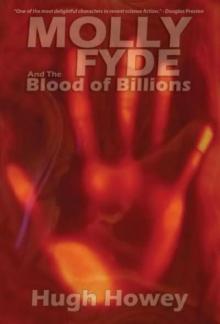 Molly Fyde and the Blood of Billions tbs-3
Molly Fyde and the Blood of Billions tbs-3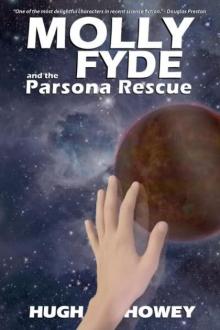 Molly Fyde and the Parsona Rescue tbs-1
Molly Fyde and the Parsona Rescue tbs-1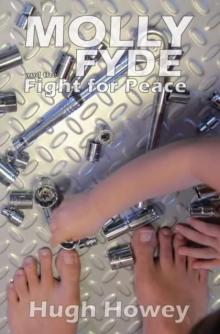 Molly Fyde and the Fight for Peace tbs-4
Molly Fyde and the Fight for Peace tbs-4 Sand
Sand The Walk Up Nameless Ridge (Kindle Single)
The Walk Up Nameless Ridge (Kindle Single) Wool Omnibus Edition (Wool 1 - 5)
Wool Omnibus Edition (Wool 1 - 5)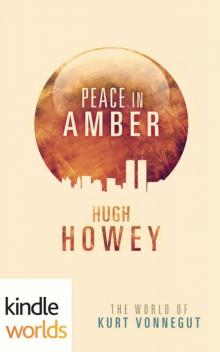 The World of Kurt Vonnegut: Peace in Amber
The World of Kurt Vonnegut: Peace in Amber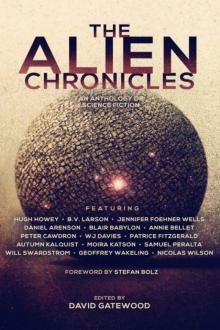 The Alien Chronicles
The Alien Chronicles Glitch: A Short Story (Kindle Single)
Glitch: A Short Story (Kindle Single)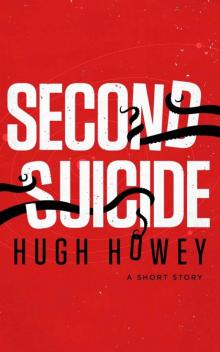 Second Suicide: A Short Story (Kindle Single)
Second Suicide: A Short Story (Kindle Single)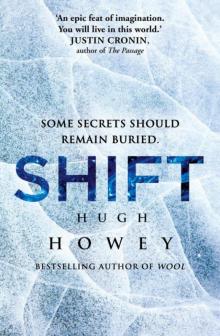 Shift (silo)
Shift (silo)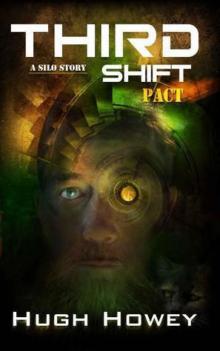 Third Shift - Pact
Third Shift - Pact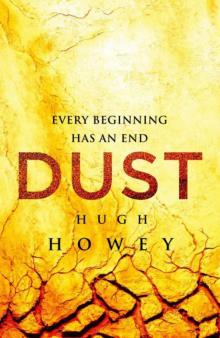 Dust s-9
Dust s-9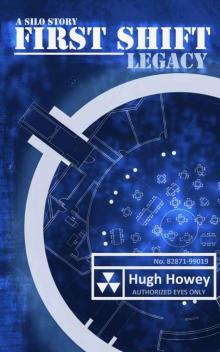 First Shift - Legacy (Part 6 of the Silo Series) (Wool)
First Shift - Legacy (Part 6 of the Silo Series) (Wool)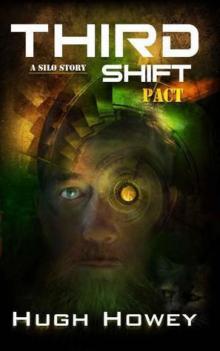 Third Shift - Pact s-3
Third Shift - Pact s-3 Sand: Omnibus Edition
Sand: Omnibus Edition The Box: A Short Story
The Box: A Short Story